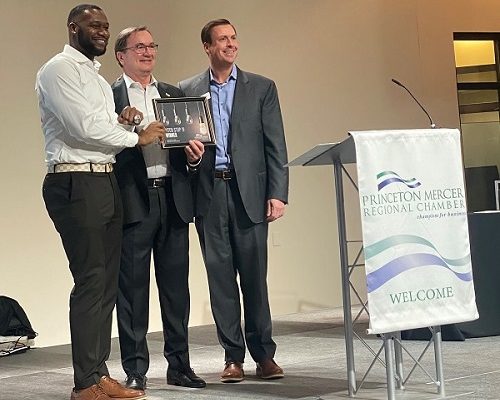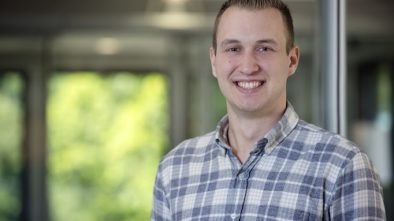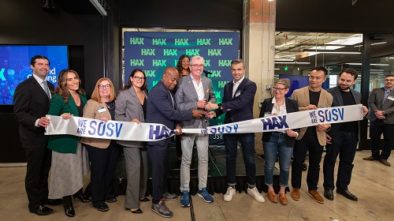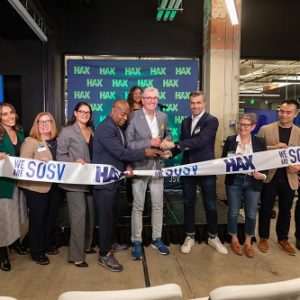Hackettstown-based Dome Audio Takes Princeton Pitch Stop Event
One New Jersey tech startup showed off its patented headphones that use “bone conduction technology” to allow listeners to both hear and feel the music.
Another startup talked up a low-cost method for recycling lithium-ion batteries, addressing a growing demand for vital metals in the auto manufacturing industry.
And a third startup showed the benefits of combining socially conscious causes and volunteerism at schools, organizations, businesses and communities.
These startups were the top three selected by the judges from a pool of 24 businesses vying for $10,000 in professional services in the fourth annual Princeton Mercer Regional Chamber Pitch Stop.
“This event is growing every year,’’ said Hal English, the chamber’s president and CEO.
“This incredible event grew out of a committee idea several years ago, from two or three startups to two dozen startups this year. It is now central New Jersey’s showcase each year, allowing all new entrepreneurs a spotlight and connections to angel investors, which is key to their success,” he said.
“The Pitch Stop has created a network of like-minded entrepreneurs who are now connected and have the chance to hone their presentation skills in front of a live audience made up of investors, bankers and government officials, among others,” he added.
The judges — Sean O’Sullivan, managing general partner of SOSV (Princeton); Susan Goldsmith, partner at McCarter & English (East Brunswick) and an investor with Golden Seeds in New Jersey; and Dan Herscovici, partner at Edison Partners (Princeton) — heard the three presentations.
“Each group had roughly 10 minutes to pitch, though we weren’t sticklers about the time,” event coordinator Gretchen DiMarco said. “The judges indicated that Dome Audio (Hackettstown) had the edge, based on the engaging presentation style of company spokesperson Tim Wright. He captured and held the attention of the audience.”
She was referring to Dome Audio’s chief strategy officer, Timothy Wright, who gave the judges the highlights of a new kind of patented headphones.
Wright, a Super Bowl-winning tight end in 2015, playing for the New England Patriots, said that the headphones consist of two forms of headphones wrapped into one. The technology sends sound directly into the inner ear, using vibrations, he said.
Bone conduction headphones have an open-ear design using transducers that rest on the bones of your skull and send the sound into the inner ear via vibrations, he said.
Dome Audio has a team of five executives and additional partners, and they plan to release the headphones later this year.
Also heard that night was Chris Johnson, executive director of Grades4Life (Somerset), who explained how the nonprofit social enterprise works with schools, organizations, businesses and communities through its range of programs that foster engagement in positive social and academic activities.
“Our program is unique because we use our platform to connect communities through education,” Johnson said.
“We have a technology platform that connects instructors and students in classroom and program settings. Instructors can encourage positive social and academic achievements with the support of the local community through the Grades4life platform. We also use our program to promote volunteerism and positive causes, which can be included for prizes and recognition for students,” he said.
The third pitch was from Princeton NuEnergy Inc. (Bordentown), with its focus on solving challenges stemming from the increasing demand for lithium-ion batteries, as auto manufacturers boost their production of electric and hybrid vehicles.
“The recycling of lithium-ion batteries requires high amounts of energy and produces significant chemical waste,” said Chao Yan, founder and CEO.
“We provide a closed-loop battery recycling solution in which we utilize our patented first-in-class technology, LPAS [low-temperature plasma-assisted separation], to recycle the used lithium-ion batteries and repurpose them into a new version of the same battery,” he said.
“Our technology can significantly shorten recycling time and costs, reduce waste generation, and produce high-performance battery materials,” he said. “Princeton NuEnergy is revolutionizing the material supply chain with its patented direct recycling process for producing high-quality cathode-active materials from spent lithium-ion batteries.”




